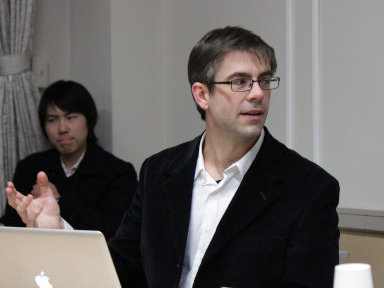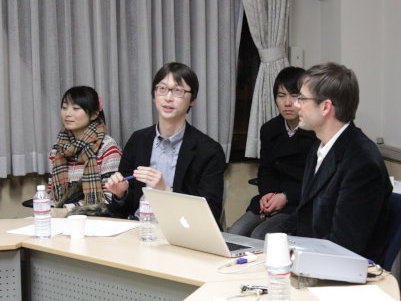[Report] George Wrisley "The Buddha Still Rides a Bike: Wittgenstein, Dōgen, and the Entanglement of Language and Enlightenment"
On December 19, 2012, Dr. George Wrisley (Assistant Professor, The University of North Georgia) gave a presentation entitled "The Buddha Still Rides a Bike: Wittgenstein, Dōgen, and the Entanglement of Language and Enlightenment" at Komaba Campus.
Dr. Wrisley, who obtained his Ph.D. from the University of Iowa, is currently teaching philosophy at the University of North Georgia and has presented many papers on Analytic Philosophy. Though his main focus is on Wittgenstein's and Putnam's philosophy, he has a broad interest in the various fields such as Asian Philosophy.

The topic of his presentation was how to understand the concept of enlightenment in Buddhism from an analytic philosopher's point of view. Enlightenment in Buddhism has often been claimed to be something ineffable, thus for philosophers who belong to Analytic tradition it appeared as enigmatic and inexplicable. With the help of Wittgenstein's and Putnam's arguments, Dr. Wrisley dealt with his first task of elucidating what kind of ineffability resides in Buddhist enlightenment exactly and to rescue the function of language and concepts in Buddhist practice, which enables us to describe enlightenment in an effable way. According to him, the ineffability of enlightenment does not necessarily invalidate the function of language, instead, it is what he calls contingent and generative such that it requires us to deepen our understanding of the nature of language and to develop our ability to utilize it as an instrument for widening our normative contexts. Dr. Wrisley presented Dōgen's conception of enlightenment as an edifying and lucid example. In Dōgen's thought, enlightenment is not a product of practice but forms a unity with practice. Since that practice is characterized as an endless articulation and creation of our normative contexts by virtue of conceptual skill, enlightenment is not ineffable in principle but embedded with infinite possibility of new linguistic expressions.

After the presentation, Dr. Furuta, who is also studying the philosophy of Wittgenstein, made a comment. Dr. Furuta pointed out that enlightenment has usually been understood as a religious concept, such as a soteriological step or a faith in Buddha, but, to him, Dr. Wrisley's formulation of enlightenment seemed to have a danger of dereligionizing it, for Dr. Wrisley has reduced the difficulty of elucidating enlightenment into the general problem of language and concepts. On one hand, this criticism is valid and effective. Indeed, enlightenment is one of the representatives of religious concepts. On the other hand, if we refer to the rich tradition of Buddhism in which we can easily find many radical interpretations of its doctrine, Dr. Wrisley's (and probably Dōgen's) formulation of enlightenment also seems to have its own validity.
Buddhism has been one of the truly ample sources of Asian thought and allows various (sometimes even contradictory) interpretations and practices. Dr. Wrisley's presentation is invaluable in the sense that now we can count one more sincere challenge and contribution to understanding this tradition from a very active school in the current philosophical industry.
(Report: MOON Kyungnam)






